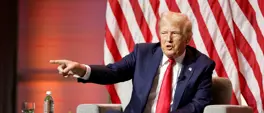Argentina ratifies WHO withdrawal during US health chief's visit
AFP
27 May 2025 | 10:21The decision to pull out of the WHO was initially announced in February by Argentina's President Javier Milei, following in the footsteps of his US counterpart Donald Trump who had said in January the United States would withdraw.
BUENOS AIRES - Argentina has ratified its decision to withdraw from the World Health Organization (WHO) and reaffirmed its collaboration with Washington, during a visit to Buenos Aires by US Health Secretary Robert F. Kennedy.
The decision to pull out of the WHO was initially announced in February by Argentina's President Javier Milei, following in the footsteps of his US counterpart Donald Trump who had said in January the United States would withdraw.
Milei's government justified its departure from the UN agency in a statement Monday.
"The WHO's prescriptions do not work because they are not based on science but on political interests and bureaucratic structures that refuse to review their own mistakes," the statement said.
Buenos Aires has previously accused the agency of "disastrous" management during the COVID pandemic with its "caveman quarantine."
The announcement came as Kennedy and Argentine Health Minister Mario Lugones met to define "a joint work agenda that will strengthen transparency and trust in the health system."
"Together with Robert Kennedy, we believe in the future of collaboration in global health. We have similar visions about the path forward," Lugones said.
Kennedy, a controversial Trump pick for health secretary given his vaccine skepticism, is also expected to meet with Milei during his visit.
In a video broadcast at the WHO's annual assembly last week, he urged other governments to withdraw from the agency and create other institutions.
In his speech, Kennedy alleged that the UN health agency was under undue influence from China, gender ideology, and the pharmaceutical industry.
The Argentine government also announced a "structural review" of national health agencies to "organize, update, and make transparent the structures and processes" of the health system "that for years operated with overlaps, outdated regulations, and limited oversight."
Get the whole picture 💡
Take a look at the topic timeline for all related articles.















